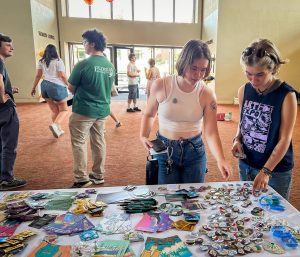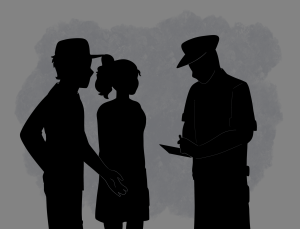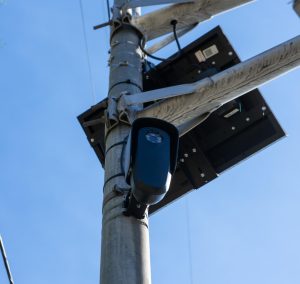We Need to Thrive: A Manifesta
April 25, 2019
In the face of a recent exodus of women faculty of color, our institution has asked us to articulate “what we need to thrive” at the college. Each of us might ponder this question, and generate our individual lists of complaints, grievances, needs, and interests. Each of us, of course, is an individual. Each of us carries distinct racial biographies, life conditions, scholarly trajectories, worldly habitations that make us particular in ways we treasure. Each of us has suffered a history of specific indignities that come from living and working as women faculty of color at a predominantly white institution in a conservative rural small town. So yes, we can each answer individually to the question of what we need to thrive as individuals at the College.
Yet as we generate our individual lists from our distinct life stories, we also let ourselves be further individuated. We stand apart from each other. We lose our sense of what makes us the “we” from which we speak. We thus participate in the institution’s gut impulse to see the exodus of women faculty of color through a narrative of individualization (“she left because….”) that blinds it to systematic patterns and institutional accountability. We submit to the ideology of diversity that would rather celebrate our differences than see us as differently positioned within the structures of our institution. We let our critiques be transformed into privatized problems that can yield to technical solutions. We become docile subjects who speak in the passive voice.
And so, we claim our collective voice here. In the active voice. We articulate our needs as a public good. We register our complaints as structural complaints. We demand institutional redress for us all, together. We say:
- Over the years, we have participated in multiple surveys, climate studies, and requests for data. Enough. No more extractive meetings and conversations that deplete our energy, perform other people’s labor, and reinforce our minority status.
- Hear us when we speak. In faculty meetings. In Department Chairs’ meetings. When we show up to your office.
- Support our intellectual projects, especially ones that emerge out of our collaborations.
- Provide us with funds to connect with family, friends, colleagues, communities that are far away from the racially isolating environment of Walla Walla.
- Compensate us for the additional labor we do mentoring and supporting students of color who vastly outnumber us and often seek us out when they need help. We are counselling students on racism and sexism while experiencing it ourselves.
- Compensate us for the additional labor we do on campus mentoring and supporting each other.
- Compensate us for the additional labor we do recruiting new faculty of color.
- Pay us fairly and equitably, with respect to our white colleagues, and each other.
- Reconsider departmental autonomy in ways that support us when our colleagues harass and disrespect us, devalue our expertise, and treat us as disposable.
- Recognize the ways that evaluative instruments are racialized and gendered and retool them accordingly.
- Hire our spouses and make college resources available to them at the same rate that white faculty spouses are hired and given access to those same resources.
- Assist us with down payments on housing so that we might form the same attachments to place as our white colleagues do.
- Hire Visiting Assistant Professors of Color for longer contracts.
- Raising multiracial kids in a predominantly white community without familial and communal networks in town is challenging. Make the College hospitable to our childcare needs. Provide on-site daycare and sick care. Make meetings child-friendly. Subsidize daycare off-campus for research trips. Synchronize the college schedule to the public school schedule.
- Provide support for those taking care of elderly or incapacitated parents in a town whose facilities are not hospitable to residents of color.
In articulating our needs, we also stand with our male faculty of color colleagues, many of whom face challenges at Whitman and in Walla Walla, some similar to ours, others more specific to their situations. And we invite the solidarity of all colleagues, staff, and students who are genuinely committed to working toward a more equitable and just Whitman College.
Signed,
Dalia Biswas, Associate Professor of Chemistry
Shampa Biswas, Professor of Politics
Leena Knight, Associate Professor of Biology
Nicole Pietrantoni, Associate Professor of Art
Elyse Semerdjian, Associate Professor of History
Yukiko Shigeto, Associate Professor of Japanese
Lisa Uddin, Associate Professor of Art History and Visual Culture Studies
Jacqueline Woodfork, Associate Professor of History
Wenqing Zhao, Assistant Professor of Philosophy







RR • May 28, 2019 at 3:09 pm
If Whitman really wants to show that it cares about diversity, than we need to support our community and the people who are a part of it with understanding and by having conversations that discuss the reality of their needs from their perspective, and not someone else’s perception. Whitman as a community and as an institution needs to acknowledge and address the issues that women faculty of color face and listen to what they have to say
Jaime Lauritsen • May 12, 2019 at 7:54 pm
Good luck with your attempt to shake down Whitman for cash and nepotistic hiring. Dressing it up as civil rights and making vague, unsubstantiated claims of racism and harassment by colleagues may or may not score you that sweet down payment money, but it will surely secure you a well-deserved place in hell.
Elaine Freedgood • May 8, 2019 at 11:14 am
Solidarity! The trolls responding here need to think a little harder about lives unlike their own.
r.l.g • May 3, 2019 at 4:09 pm
This amazing. Now, please speak with the staff that has a many women of color and are being paid the wages of the working poor on this campus.
Old White Dude • May 2, 2019 at 9:22 pm
I am an old white man and I know some stuff. I was married to a black woman once then I divorced her. This means I can’t be racist, ever. Women of color are arrogant! They take tenure track jobs away from smart white men who are stuck being adjuncts. These women should be grateful to get what they got and be quiet, silent minorities and stop talking back! Life is really good for women of color in the academy, especially at Whitman where affirmative action has been so damn successful. I know this because I have an Asian friend. She answers my emails, whereas others don’t, and I continue to sit in front of my Commodore 64 computer and wonder why no one talks to me. I’m angry that these women are uppity and think they deserve stuff. I deserve stuff! They certainly don’t deserve more because they took jobs away from white men and even if the faculty is 90% white, that’s not good enough! They won’t deserve the 10% they have. Every time a person of color gets a job it is well known that a white person who deserved the job more loses, that’s logic! Next thing you know, they may want to take over the country or something and kick us all out of here! That’s what I hear on my AM talk radio show. I think I’ll ramble some more just because I have the space and sense of self-importance to do so. I think I’ll add that I received a dumpy Whitman education and was once a Whitman employee too just to keep people wondering whether or not there was once an affirmative action program for mediocre white men back in the 60s.
Jambes Marks • May 2, 2019 at 2:03 pm
Those who can, do. Those who can’t, teach. Those who are snowflakes teach at Whitman. Get a job in the real world and see what happens to your “manifesta”. NFG
Walt Witman • May 2, 2019 at 11:41 am
So basically we should listen to them and give them money not because they have good ideas or a proven track record of performance but because they’re black and female?
73% of the United States is white, if you don’t like it feel free to leave
By the same token if you’re “outraged” nobody paying you for your “emotional labor” then stop doing it. I’m sure nobody would care.
Jonas Pell • May 2, 2019 at 10:40 am
How the heck can people get erased? You race hustling ignoramuses are a DETRIMENT to education and grifters to boot.
Tivon Sadowsky • May 1, 2019 at 6:51 pm
In Response to Bruce J. Jones:
Your comment reeks of old white male privelege. The teaching environment at Whitman may be better than years past, but in no way does that mean we should stop striving to make things better.
-Tivon Sadowsky ’20
Emma Philipps • May 1, 2019 at 11:35 am
Responding to comment above:
I would think a man who describes himself as “woke” would try to empathize with the disproportionate amount of weight that the institution puts on women faculty of color. Moreover, I find it odd that a woke man would so easily dismiss the contributions that these women have made to academia, especially women who were once his colleagues, when the tradition of scholarship gave him his Princeton PhD. When I attended Whitman, I had the privilege of closely working with some of these professors, even seeking counsel and mentorship from them. Not only do these women enrich the academic life of Whitman College, but they act as support to students of color at the school, who find themselves out numbered by white students and faculty. Whitman prides itself off of the close relationships formed between teachers and their pupils. The institution needs to recognize the emotional toll that this entails, especially since the support they may find from home or their communities is absent from the isolated community they live in. A call to attention and a constructive list of demands is not arrogant. Rather, it is a list of things these women need to thrive. Without faculty, the identity and reputation of Whitman College cannot exist, and if we refuse to support faculty, we do a disservice, not only to these individuals, but to the students who have made the decision to attend a school dedicated to cultivating an intellectual life. To the faculty who’ve contributed to this manifesta: thank you. You continue to inspire and demonstrate to the students of Whitman College how to create meaningful change in the institutions we are a part of. I am proud to have known you and studied with you.
Susanne Beechey • Apr 29, 2019 at 7:57 pm
When you thrive, we all thrive and Whitman thrives! Thank you for so clearly answering the question posed by the institution every few years with such clarity and vision. In solidarity and appreciation.
Bruce J. Jones • Apr 29, 2019 at 6:24 am
A friend forwarded the manifesto to me, likely knowing I’d have an opinion: I’ve had many thoughts, most of them negative as what was written sounds like “pay us reparations for being women of color in a generally white environment in the boondocks where too much is expected of us”.
I thought of a young relative who asked me to critique her college essay (now at the Whitman of Maine, Bates) and I did so after having a martini, always a mistake. The essay was about having to put her 25K horse down after an illness and I said, “This reeks of affluence and privilege. Find another topic.” She did.
I’m penning this reply at 6 a.m. Walla Walla time, thus no martini: The manifesto reeks of arrogance.
I’m remembering, as an admission officer (Associate Director of Admission ’05-’15), how we always tried to get a diverse selection of faculty to attend counselor visit events and how we went to the well time and time again (Thank you Helen Kim for your faithful attendance) and how it took 25 invites to maybe get 7 or 8 faculty to attend. I remember one faculty member turning me down then later telling me why: A white man with a Princeton PhD, highly thought of by peers and students, living the itinerant adjunct life on a terminal contract, something that probably would not be his lot in life were he a person of color. So on some level those reparations are already being paid and I understand and support that cost.
My former wife, black with Cal and Stanford credentials: I remember her palpable discomfort at a San Juaquin Valley restaurant on our way to visit my folks in the Sierra, surrounded by white farm families. I’ve always been sensitive to micro (and macro) aggressions since a little boy, my black friend Weems at Cub Scouts hearing racist comments and quietly smiling, eyes down. I’ve seen that shit in every school I ever worked in (37 years in public schools before my Whitman admission gig), multi or mono cultural. I’ve been woke long before someone came up with the word.
And I remember the Whitman I attended, a dump of a campus, a dump of a town, as white as white gets, the professors 90+% male, suits and ties discarded for overalls to work the summer wheat harvest. Not a lot of publishing going on but demanding academics and no need to publish a paper that only family and professional friends will ever read. Real world? The academic life, especially with tenure and maybe only 2/3 classes to teach each semester, sabbaticals every few semesters, is a walk in the First World park.
Bruce J. Jones ’67
Mira Skladany • Apr 26, 2019 at 2:11 pm
!! this is powerful and special and long overdue. @Whitman compensate these women for doing this work for you. Go beyond “thank you’s.”
Cody Hipskind • Apr 25, 2019 at 6:22 pm
Thank you so much for writing this: we as a campus need to listen to and act on the demands which come from out of intersections of gender, race, and labour. What can organizations like the Walla Walla DSA be doing to support the pursuit of the goals outlined above?
Lydia McDermott • Apr 25, 2019 at 9:00 am
Thank you for publishing this Manifesta. I write to express solidarity with these requests and sincerely hope the administration is listening.
Lydia McDermott,
Director of the Center for Writing and Speaking
Aisha Kimbrough • Apr 25, 2019 at 7:44 am
LISTEN TO WOMEN OF COLOR!!!!!!!!!!!!!!!
Throughout my four years at Whitman, I have consistently witnessed the ways in which women of color are not only disenfranchised, but ERASED at our institution. We are constantly told that we are valued, we expend so much emotional and physical labor, and in return are not listened to, not given recognition, and not compensated adequately.
As a woman of color, I thank all the women of color that put in energy and passion to write this letter. It is moments like these that I am reminded that predominantly white institutions were made and constructed BY WHITE PEOPLE FOR WHITE PEOPLE. Whitman, it’s time to listen. We talk about how much we care about “diversity, equity, and inclusion” yet fail to meet the needs of the marginalized folk right here on campus.